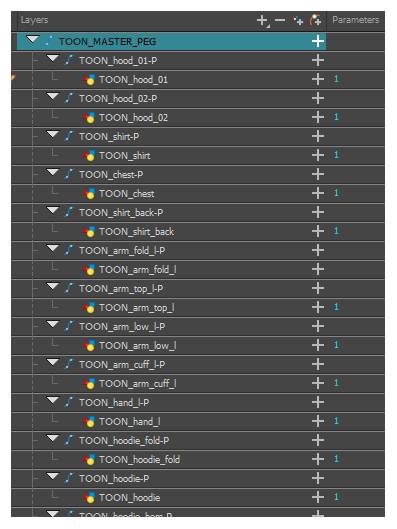Rigging the Body
When the character's head is ready, you can move on to rigging the body. You can do a simple rigging where all the body parts are independent of each other, or create parenting between some of the layers. Refer to Creating a Hierarchy to learn how to parent your layers.
Simple rigging consists of leaving the layers in the Timeline view without doing any kind of parenting. Later on, you will attach those layers to a master peg and organize them in the correct order—see Adding the Master Peg and Ordering the Layers.
Your drawings must be connected to a Composite node. A Composite node takes all the drawing layers connected in it and flattens them into a single image which allows you to organize your network and manipulate your puppet easily. It also allows you to apply effects on your complete character. The Composite node is useful when you are working with many nodes in the Node view.
If you create your layers in the Timeline view, they will automatically be connected to the Composite node in the Node view, as long as you are not using the Display All mode in the Display toolbar.

Connecting Nodes to a Composite Node
In Harmony, if your nodes are not connected to a Composite node in the Node view, you can connect them all at once following the Timeline order.
- If you do not have a Composite node, open a Node Library view. From the top menu, select Window > Node Library.
- Select the Favorites tab and select the Composite node.
- Drag the Composite node to the Node view or press Ctrl + H.

- In the Timeline view, select all the nodes you can to connect to your Composite node.

- Right-click on the selection and select Connect To Composite > select the desired Composite node.
Your nodes are now connected to the Composite node in the same order as the Timeline view.








